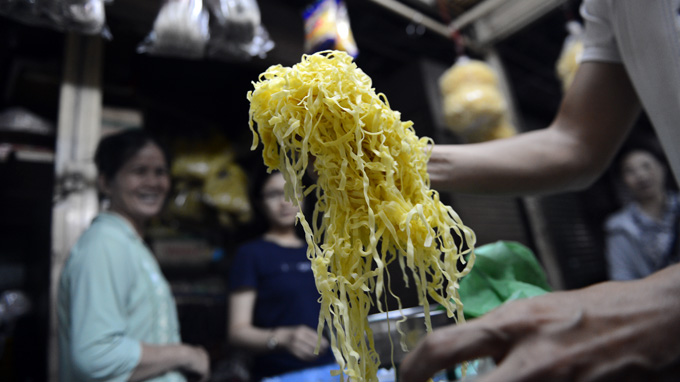More than 80 percent of the Vietnamese rice vermicelli samples taken for toxicity tests in Ho Chi Minh City have been found to contain a banned and cancer-causing chemical, according to the report of a recent food safety inspection.
The shocking result was announced last week by the inspector, the Center for Study and Consultation on Consumerism (CESCON), which collected 30 samples of six types of Vietnamese rice noodle, including pho, bun, banh canh, banh hoi, banh cuon, and banh uot between June 15 to 25 for tests. The ingredient pho is used to make pho, a popular food for foreigners.
The center said the samples were randomly taken from nine food selling facilities, including three supermarkets (Co.op Mart Cong Quynh, Maximark Cong Hoa, and Big C Hoang Van Thu), five markets (Pham Van Hai, Ben Thanh, Tan Son Nhat, Go Vap, and Ba Chieu), and a grocery in Tan Binh District.
Shocking result
CESCON said five out of six types of the rice noodle, or 24 out of 30 samples and an 80 percent proportion, were found to contain tinopal, a chemical that is not included in the list of allowed food additives released by the Ministry of Health.
Shockingly enough, 100 percent of the collected samples of the banh canh, banh hoi, and banh uot were found to contain the banned chemical.
The respective figures for bun and pho are 56 percent, and 75 percent.
“Using this banned and hazardous chemical in making rice noodle is against the law while causing harm to consumers,” CESCON deputy director Do Ngoc Chinh told Tuoi Tre.
Regular and long consumption of tinopal can do harm to consumers’ digestion, and even cause kidney and liver failures as well as cancers, Chinh warned.
Supermarkets surprised
Petty traders at the markets where the toxic noodle was found said they do not know where their products come from, as they are delivered directly to their booths on a daily basis by “our trade partners.”
Maximark Cong Hoa supermarket’s director Pham Phuong Thao said she was surprised to learn that the vermicelli at her facility contained toxic chemical because “they all passed food safety checks before being put on shelves as per law.”
Maximark will thus stop selling this type of commodity, she said.
A representative of Co.op Mart also said supermarkets under its chain always test the rice noodle before sourcing them, but no bad results have ever been reported.
Chinh, the deputy director of CESCON, meanwhile pressed that the noodle producers should be responsible for what chemicals they use in making the products.
“It’s also the responsibility of the relevant government agencies to warn consumers against the toxic food and completely crack down on the problem,” he urged.
Chinh said his center will submit the survey report to the health ministry and other relevant agencies.






















































